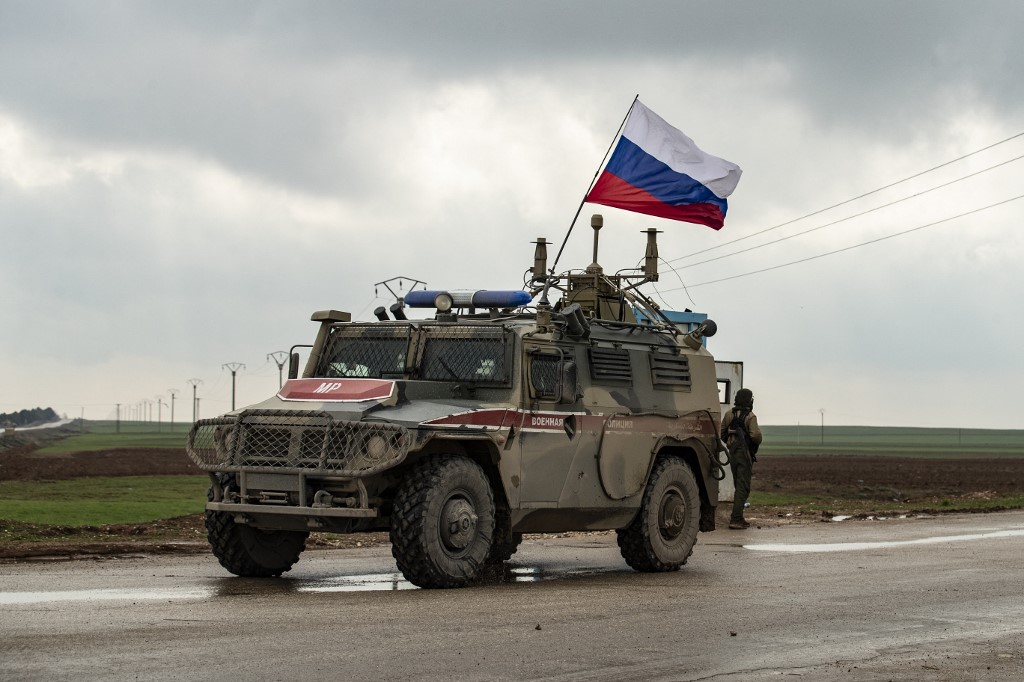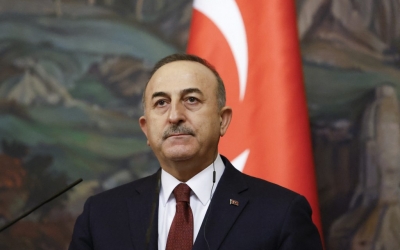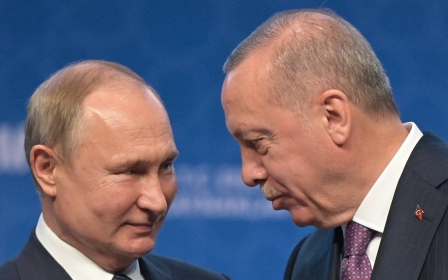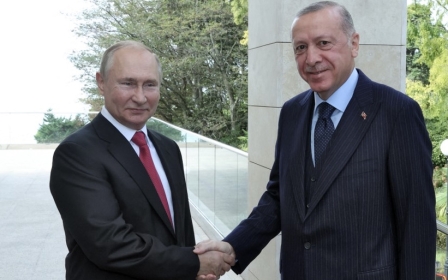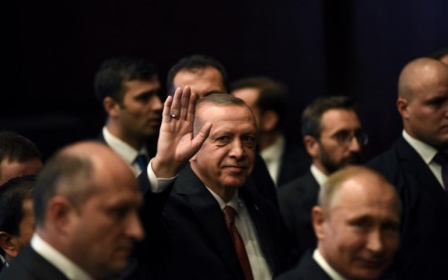How the Russia-Ukraine war is changing Ankara's relationship with Moscow
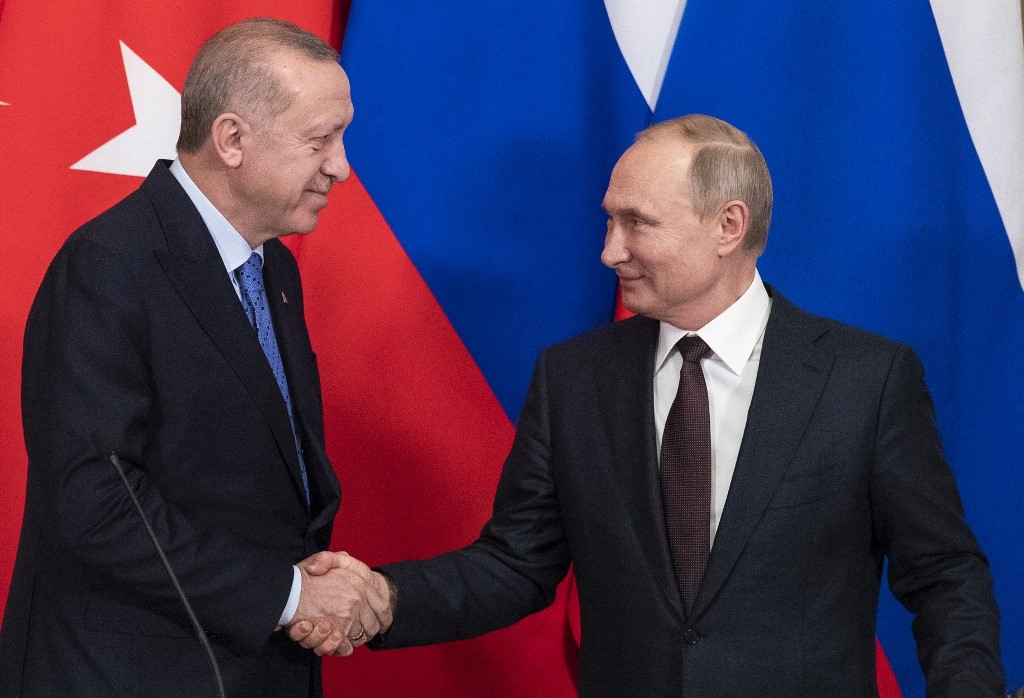
For nearly three months, Russia’s war on Ukraine has shattered the country and shaken the regional and global geopolitical balance. Russian President Vladimir Putin has pursued a dangerously aggressive policy, fixated on revisionist historical delusions about Moscow’s place in the world.
In the post-Soviet era, Russia has exported instability to various theatres in Russia's borderland and beyond: Chechnya, Ossetia, Abkhazia, eastern Ukraine and Syria. But its actions, until now, have drawn little international reaction. Moscow did not expect the West to openly provide military support to Ukraine, nor for China to hesitate in supporting Russia. Russia is largely on its own, marking a tactical and strategic disaster.
Despite being caught in a difficult position, Ankara has reacted shrewdly, adopting a balanced approach since the war broke out
From Turkey’s perspective, the Russia-Ukraine war has come at a difficult time. Unlike other third parties, Turkey has been in a direct or indirect military confrontation with Russia since 2015, when Turkey shot down a Russian fighter jet at the Turkey-Syria border. Since then, Ankara has gained some familiarity with Russia’s military and geopolitical tactics.
Having Russia dominate the Black Sea to the north, while also maintaining a presence south of Turkey in Syria, would pose a severe threat to Ankara. The economic fallout of the war is also significant, as losses mount for Turkey in its trade with both Russia and Ukraine. The potential for a prolonged war, or a spillover of the conflict into the Black Sea, present grave concerns for Ankara.
At the same time, there is a clear perception gap between Moscow’s analysis of the Ukraine invasion and that of the rest of the world. Upon launching the invasion in February, the Russians were confident that their military vehicles would advance largely undetected and unopposed, bringing a swift victory. That Moscow did not calculate the extent of resistance in Ukraine, a nation with one-third the population of Russia and geographically the second-largest country in Europe, does not bode well for Russia’s ability to extricate itself from the conflict without incurring major damage.
Holding the world hostage
Putin was well aware that a war between Russia, a nuclear power and leading food and energy producer, and Ukraine would have global and regional implications. He likely aimed to hold the world hostage by leveraging Russian energy, raw materials and food supplies. Russia has thus emerged as a serious threat to the global order, whether through reckless invasions, increasing refugee flows, heightened global inflation or the threat of nuclear war. Blind to how others would react, Moscow has shown itself to be an irrational actor on the global stage.
Despite being caught in a difficult position, Ankara has reacted shrewdly, adopting a balanced approach since the war broke out. Turkish mediation created both time and geopolitical space for Ankara during the initial phase of the crisis, and this role will likely transform further in the days and weeks ahead.
Ankara’s recent closure of its airspace to Russian military flights to Syria is also a major step, which will be seen as an important message to all involved parties. Even if Turkey is not participating in sanctions against Russia, it is still taking a stand in other ways.
Turkey’s economy has been negatively affected by the war; in addition to global inflation, Russia and Ukraine comprise a significant portion of Turkey’s foreign trade. On an annual basis, Turkish exports to Russia exceed $5bn and exports to Ukraine $2bn, while Turkish imports from Russia exceed $28bn and imports from Ukraine $4bn. In addition, Russia and Ukraine account for around a quarter of tourists to Turkey, with millions flocking to the country annually. Given current conditions, tourism will surely take a major hit in 2022.
Fragile alliance
Geopolitically, Ankara has faced a number of challenges in recent years related to Russia’s intervention in Syria and the increasing threat of terrorism. The failed 2016 coup attempt also complicated Turkey’s political calculus. With the rise to power of former President Donald Trump in the US, which ushered in an era of global uncertainty, Turkey began to develop a fragile alliance with Russia, despite their opposing geopolitical interests.
This delicate alliance has continued despite repeated clashes between Russian and Turkish forces in proxy arenas - and even as Turkey’s relationship with Europe and the US, and its role in Nato, has been increasingly strained. One tangible cost for Turkey was its removal from the F-35 programme, which had been vital to Turkey’s security, after Ankara made a deal with Moscow to purchase the S-400 air defence system.
Through its military intervention in Syria, Russia has also contributed to the massive refugee flows into Turkey. The worsening security situation in the Black Sea region further threatens Turkey’s stability, meriting a careful assessment and cautious response from Ankara.
By successfully mediating between Russia and Ukraine - despite the lack of tangible results - Ankara has shown the West that it is not firmly in Russia’s camp, while showing Putin that it does not unconditionally side with the West. Thus far, Washington’s response has been somewhat muted: in addition to the US-Turkey Strategic Mechanism launched in April, the US recently affirmed that the sale of F-16 fighter jets to Turkey would serve Nato’s long-term unity.
Since Russia’s invasion of Ukraine, the new realities on the ground present an opportunity for Ankara to reset its relations with Russia, moving beyond the ad-hoc alliance that exists today. The new geopolitical realities will surely put additional pressure on Russia in Syria, to Turkey’s benefit. At the same time, Turkey is bolstering its geopolitical position by improving relations with the West.
As Russian alliances crack and Moscow increasingly becomes a burden to its partner nations, its relations with Ankara will inevitably evolve. Using the advantage of its Nato membership to prevent the Black Sea from falling under Russian control, and by taking steps to reduce uncertainty on its southern border, Turkey can rationalise its relations with Russia while building new common ground with the West.
Nordic Nato bid
To this end, Ankara needs to make use of its delicate diplomatic maneuvering capabilities. Current geopolitical realities indicate that Russian sclerosis and the West’s proxy war will continue. Turkish involvement must be multilayered and multi-phased. President Recep Tayyip Erdogan’s move to act as a mediator helped Turkey to accrue diplomatic credit, gaining trust from all parties. Ankara’s closing of its airspace to Russian military flights to Syria was another bold step.
Erdogan is sending a clear message to all parties in the Russia-Ukraine crisis, reminding them that Turkey is part of Nato. But now, in an unexpected turn, he has come out against allowing Sweden and Finland to join Nato, which could dash their hopes of becoming members.
Turkey must stand by initiatives that prevent or reduce the transfer of power to Russia
This week, both Putin and Erdogan continued to talk about Nato’s expansion. Putin shifted his position by declaring that Sweden and Finland potentially joining the military alliance “does not pose a direct threat to Russia”. At the same time, Erdogan was reiterating his rejection of the move. While it may be Turkey’s legitimate right to use the issue of Nato membership for a diplomatic exchange, his comments have nonetheless fomented ambiguity.
Ankara knows that Moscow’s southern push poses a potential structural security problem, if not an imminent threat. To combat this threat, Turkey must stand by initiatives that prevent or reduce the transfer of power to Russia. Ankara’s fight against terrorism must be built on a system of alliances, and its geopolitical prowess should not be derailed by the Nordic struggle to find a safe haven in Nato.
The views expressed in this article belong to the author and do not necessarily reflect the editorial policy of Middle East Eye.
Middle East Eye propose une couverture et une analyse indépendantes et incomparables du Moyen-Orient, de l’Afrique du Nord et d’autres régions du monde. Pour en savoir plus sur la reprise de ce contenu et les frais qui s’appliquent, veuillez remplir ce formulaire [en anglais]. Pour en savoir plus sur MEE, cliquez ici [en anglais].



